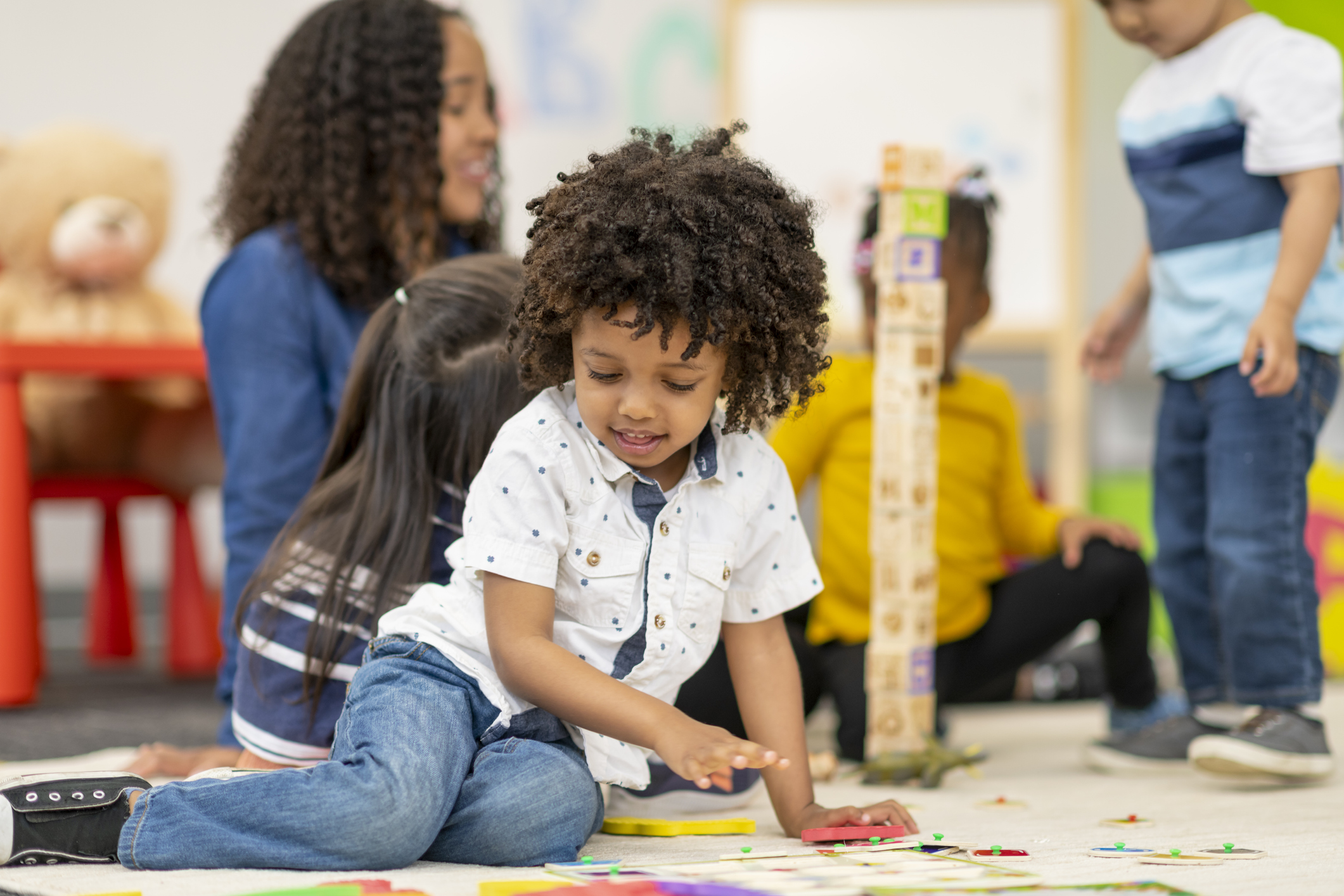
I started reading in kindergarten and quickly fell in love with my classroom’s little library. When I had my first child, I hoped she would share my passion for books. We filled her nursery with board books and worked on her letter recognition skills as she got older, but our time by her bookshelf quickly became a negative experience.
She got frustrated as we read when she couldn’t name the right words or letters. Sometimes it led to her to throwing books across the room or bursting into tears. I talked with her pediatrician about it, who sent us to a psychologist with experience in dyslexia.
My daughter’s diagnosis was an overwhelming relief. Our hearts hurt at the challenges that awaited her years in school, but a diagnosis pointed us toward ways to help her. These are some of the most important things I’ve learned in the years since.
More from CafeMom: Tips To Keep Kids' Physical & Emotional Health in Check as They Head Back to School
Start by Learning the Facts
It’s scary to hear a doctor diagnose your child with any condition. We want to shield our children from any challenges or hardships life throws them. Dyslexia may seem intimidating in that initial doctor’s office visit, but learning some facts about it makes it easier to advocate for your child’s needs.
Recent research available through the National Library of Medicine shows that dyslexia affects up to 20% of the population, or one in five people. That’s more than a billion people living joyful, fulfilling lives. Even if it feels like your family is suddenly alone, many others have been in your shoes and found ways to help their children through their educational journeys.
It’s also crucial for parents to know that not every school system has tools to help kids with dyslexia. Our daughter’s first public school classroom had no kindergarten teachers trained to help students with dyslexia succeed. Our search for private schools with dyslexia certifications was challenging, too.
You should look for the same certifications if your child struggles in school. It can feel exhausting if you’re not close to numerous school systems, but the results are worth it. We found a public school with a certified teacher who developed accommodations that empowered our daughter, like these:
- Reading the daily and weekly schedules out loud
- Making a special bookmark so our daughter could follow along more easily
- Printing worksheets in larger font sizes for her
- Granting extra time for writing and reading
- Highlighting sight words in written instructions
Ask Them How You Can Help

When your child gets old enough to talk about their needs and challenges, ask how you can help. I’ve been the parent who assumed everything was fine, which made my daughter think any new or existing challenges were a personal fault.
We might not have the same specialized training as certified teachers, but parents can do so much to help their dyslexic children in their educational journeys. Video games were an early tool that I began relying on when my daughter expressed frustration with being unable to concentrate for very long.
First, I picked a video game she wanted to try, like the Jak and Daxter series. Giving her more time to play it throughout the week allowed her to practice tracking words on the screen while playing an immersive, mystery-themed game. Research shows that video games improve a child’s attention span, which we saw happen in real time with our daughter’s concentration.
When she got older, we downloaded flashcard apps that read the words out loud. Our daughter studied more easily by listening to her homework. She also began recognizing those words more easily during school because she was more engaged while she studied.
Helping your child can also be super simple. Our daughter’s pediatrician recommended we develop a sleep routine early on and stick with it through the years. Kids with dyslexia demonstrate more active brain waves while they sleep, which often causes issues with falling or staying asleep. Finding what helps your child’s unique mind rest will give them the energy boost they need to conquer more challenging lessons.
Don’t forget about your child’s diet, either. Vitamins won’t cure dyslexia, but they can help. Researchers found that dyslexic young adults who stuck with the Mediterranean diet had less difficulty with testing than those who didn’t. The eating plan uses fish as a protein foundation, so your child may benefit from nutrients such as omega-3 fatty acids that nourish the brain on a cellular level.
As always, chat with your child’s pediatrician before making dietary or lifestyle changes. They’ll work with you to tailor your ideas to your child’s health needs.
Find New School Activities
Learning disabilities might be isolating for reasons unrelated to bullies. Think about how many school clubs revolve on reading. Groups that teach students to enjoy reading, creative writing, and history in their free time are important, but children with dyslexia won’t be able to engage if they have the same interests.
I showed our daughter a list of other school activities she could consider first. Clubs involving sports, movies, pottery, cooking, theater, and more are easier for her. She can put anything she has to read in a text-to-voice app for instant practice.
We’ve also looked into starting clubs. Our daughter met other dyslexic kiddos when she began her first year at middle school. She discovered they all wished they felt like they belonged in the school library, so we started a book club for dyslexic kids. They meet twice a month to discuss their latest audiobook. The social connection and educational empowerment make my daughter shine with joy.
Work on Their Cognitive Skills

Kids have significant neuroplasticity. Their minds are young and haven’t developed the repeated neural pathways that influence how adults act and think.
There’s a misconception I’ve found in my years of jumping between parental support groups. Some that operate on social media without the guidance of a psychologist can perpetuate the idea that parents can train their children out of dyslexia.
That isn’t true. It comes from the growing reality that even though you can’t make dyslexia disappear, working on cognitive skills with your child more than other children can make it easier for them to read and learn.
Find an educational therapist or learning specialist to help you create a routine around cognitive skill improvement. A specialist told us to work on four primary components — memory, attention, processing, and sequencing. They’re in the toolbox every person uses to read and succeed in other areas of life, too.
Specialized games and adapted classroom plans may give your child a better attention span and processing speed. Talk with their teacher and doctor to integrate these things into their daily life. We’ve found that the little things can make the biggest difference in our daughter’s life.
Show Them Dyslexic Representation
Kids with dyslexia may feel isolated. They might not have anyone else with the condition in their classroom or friend group. Children may develop a negative association with dyslexia if bullied due to their learning disability.
We wanted our daughter to know that people with dyslexia can do anything. She should have the biggest dreams and set the highest goals. She felt more encouraged to do just that when we showed her dyslexic representation.
Young kids won’t feel alone or different if they watch movies and TV shows with characters like them. Our daughter loved watching George in Arthur because she shared the same learning disability.
There are so many graphic novels, picture books, and audiobooks for dyslexic children to identify with, too. The Percy Jackson series makes dyslexia a superpower, and other books such as Dying to Know You, Life at the Speed of Us, and Playing Tyler show coming-of-age storylines with dyslexic characters.
Kids should have public figures they can admire because they both have dyslexia. A simple internet search will make the world feel much more welcoming for a child who feels alone while growing up with dyslexia.
Embrace Every Child’s Unique Educational Journey
Graduating from grade school requires more than time in a classroom. Kids also need comprehensive and loving support from their parents. These are the best things we implemented for our daughter that helped her thrive inside and outside school. Your child may have the same experience, but you can always talk with their pediatrician about any questions or concerns.



